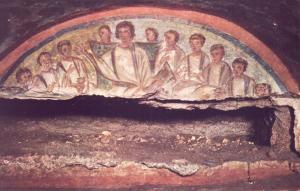 In the writings of Taoist philosopher Chuang Tzu, we find an interesting conversation. A tutor to the crown prince of Wei had to deal with the question of how to teach and train the prince when that same prince, K’uai-k’uei, seemed to lack discipline and virtue. The tutor knew that one day the prince was going to rule. If the prince could not be corrected and prevented from continuing in vice, he would end up destroying the state. On the other hand, the tutor was a mere servant; if he tried to correct the prince, it would be as if he did not know his place in society and his life would be put at risk. What, then, he asked Ch’u Po-yu, a minister in Wei, should he do? The response was rather interesting:
In the writings of Taoist philosopher Chuang Tzu, we find an interesting conversation. A tutor to the crown prince of Wei had to deal with the question of how to teach and train the prince when that same prince, K’uai-k’uei, seemed to lack discipline and virtue. The tutor knew that one day the prince was going to rule. If the prince could not be corrected and prevented from continuing in vice, he would end up destroying the state. On the other hand, the tutor was a mere servant; if he tried to correct the prince, it would be as if he did not know his place in society and his life would be put at risk. What, then, he asked Ch’u Po-yu, a minister in Wei, should he do? The response was rather interesting:
“A very good question,” said Ch’u Po-yu. “Be careful, be on your guard, and make sure that you yourself are in the right! In your actions it is best to follow along with him, and in your mind it is best to harmonize with him. However, these two courses involve certain dangers. Though you follow along, you don’t want to be pulled into his doings, and though you harmonize, you don’t want to be drawn out too far. If in your actions you follow along to the extent of being pulled in with him, then you will be overthrown, destroyed, wiped out, and brought to your knees. If in your mind you harmonize to the extent of being drawn out, then you will be talked about, named, blamed, and condemned. If he wants to be a child, be a child with him. If he wants to follow erratic ways, follow erratic ways with him. If he wants to be reckless, be reckless with him. Understand him thoroughly, and lead him to the point where he is without fault.[1]
To teach someone, you need to reach them where they are at. Being too forceful and condemnatory will only end in rejection, and you might even risk losing your life through unseemly behavior. Staying at their side, dealing with their problems through a compassionate and understanding embrace will allow you to be with them. Being with them, you will able to show by example what they lack without being accusatory. They will be willing to listen because you are not pushing them away.
The Apostle Paul could be said to have followed this ideal; he said that he aimed to become all things for all people, following them by their side, being with them so that he can share the blessings he has received to all he should meet:
For though I am free from all men, I have made myself a slave to all, that I might win the more. To the Jews I became as a Jew, in order to win Jews; to those under the law I became as one under the law — though not being myself under the law — that I might win those under the law. To those outside the law I became as one outside the law — not being without law toward God but under the law of Christ — that I might win those outside the law. To the weak I became weak, that I might win the weak. I have become all things to all men, that I might by all means save some. I do it all for the sake of the gospel, that I may share in its blessings (1 Cor. 9:19-23).
Paul specifically said he is doing this for the sake of the gospel. He knew that the best way to reach others was not to be overly preachy (though he did preach), but to witness to them by being their companion, by working with them, by being with them and sharing in their trials and tribulations. Yet, it was Jesus himself who gave Paul this notion; he was, after all, but a disciple of Jesus, an Apostle specially chosen to reach the Gentiles. He followed after Jesus, and Jesus came to the world to seek out all the fallen in creation. Jesus was the good shepherd: “I am the good shepherd. The good shepherd lays down his life for the sheep” (Jn. 10:11 RSV). By going out and finding the lost sheep, protecting them from all harm, they come to know Jesus and trust him; being by their side, they can love him. When he challenges them with correction, they will not run away, but rather, they realize that he is guiding them to where they need to be in order to be free from danger, as the Psalmist so long ago suggested:
The LORD is my shepherd, I shall not want; he makes me lie down in green pastures. He leads me beside still waters; he restores my soul. He leads me in paths of righteousness for his name’s sake. Even though I walk through the valley of the shadow of death, I fear no evil; for thou art with me; thy rod and thy staff, they comfort me. Thou preparest a table before me in the presence of my enemies; thou anointest my head with oil, my cup overflows. Surely goodness and mercy shall follow me all the days of my life; and I shall dwell in the house of the LORD for ever (Ps. 23:1-6 RSV).
Jesus, the good shepherd, the proper teacher, affirmed in his life and fulfilled in a transcendent way the wisdom implied in the passage taken from the writings of Chuang Tzu. Human wisdom, when it truly is indeed wisdom, finds its fulfillment in Jesus Christ, who is himself Wisdom incarnate. This is how and why the early Christian apologists often took to the writings of the philosophers, engaged them, sought out the grains of truth in them, and brought them out in the open so as to show how they pointed to and were fulfilled by Jesus Christ. What they did, we need to continue to do; to take the wisdom of the world and lift it up and unite it with its fulfilment in the Wisdom of God.
Jesus is our teacher. He came to lead us out of the personal hell which we made for ourselves so that we can become co-rulers, co-heirs of the kingdom of God with him. He is with us always, no matter where we are, showing us his love. He did not come to judge the world but to save it, and so he came to redirect us so we do not have to suffer the consequences of our own foolishness as we lean on him for his wisdom. Even in the shadow of the valley of death, he will not part from us; he came to us and seeks to harmonize with us through his love. He knows us and has compassion for us, “For we have not a high priest who is unable to sympathize with our weaknesses, but one who in every respect has been tempted as we are, yet without sin. Let us then with confidence draw near to the throne of grace, that we may receive mercy and find grace to help in time of need. “(Heb. 4:15-16 RSV). He brings us the grace we need to overcome our imperfections, allowing us to truly become children of God. He will be beside us while we sin; he is with us even unto the end of the age; he is there, and truly his working with us, allowing us to load upon him our sins so that we can be free, “Take my yoke upon you, and learn from me; for I am gentle and lowly in heart, and you will find rest for your souls. For my yoke is easy, and my burden is light” (Matt. 11:29-30 RSV). He leads by example, the example of love; he follows us with that same love. He truly is the ideal teacher who teaches us all, often in and through a transcendent silence which needs no words.
We, then, need to become like Jesus and Paul, imitating them in the way they embraced others. It might not be easy, especially if we are far from the perfection which we wish to have. How can we be teachers when we are still in need of direction ourselves? But that is how and why we can truly meet with others where they are at; we still suffer temptation and falter in the path of righteousness. We know the mistakes, and how and why people fall for them. Knowing ourselves like this allows us to be humble. Remembering our our weakness and the grace we receive should have us likewise no longer be judgmental with others in their weakness. And then we shall learn they are doing the same with us. We are helping each other achieve our ultimate goal, the happiness and joy which God brings to those who enter into the kingdom of God. We can’t do it apart. We need each other.
[Image=Christ the Teacher from the Catacombs [Public Domain] via WikiMediaCommons ]
[1] Chuang Tzu, Basic Writings. trans. Burton Watson (New York: Columbia University Press, 1964), 58-9.
Stay in touch! Like A Little Bit of Nothing on Facebook













